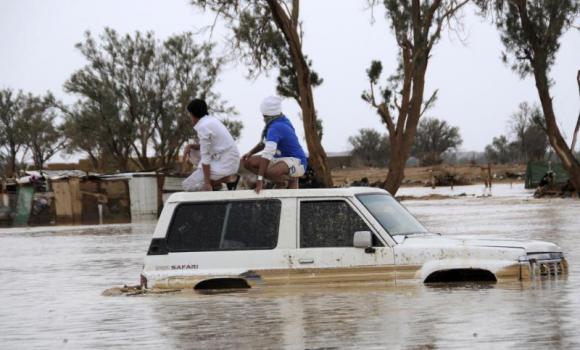
Jeddah, Jan 29: Torrential rains and dust storms have swept the Kingdom, resulting in evacuations from wadis and other threatened areas of Tabuk and the closure of Tabuk schools on Monday.
Weather forecasters are saying that the bad weather could stay around for the next couple of days.
Clearly, the hardest hit area was Tabuk where schools were also closed for the week out of concern for the safety of children and teachers.
“Due to the heavy rain in the region, we decided to suspend school classes for the safety of our students,” said Mohammad bin Abullah Al-Lhedan, general director of education in Tabuk.
At least, one death has been attributed to the weather. A baby boy died in Wadi Rawafa when he fell from the hands of his mother after the family’s car was trapped in floodwaters. Civil Defense rescued the family and recovered the child’s body, according to Prince Fahd bin Sultan, governor of Tabuk.
Some roads leading into flooded valleys in the region have been closed and residents of the southern district of Tabuk evacuated in anticipation of heavy rains. Twenty-five cars and three school buses were saved by Civil Defense, the buses as they were about to be swept away to the Salw Valley. Numerous agricultural roads connecting villages in the region were also flooded.
Col. Mamdouh Al-Anazi, spokesman for Civil Defense, said his forces had rescued 23 people, including women and children in Damj district, using helicopters on Sunday.
Al-Anazi said the civil defense had called for evacuation of the southern districts of Abu Sabaa, Kuraim and Abu Dumaik. “We have received reports of some 273 people and cars trapped in floods,” he said. The worst hit districts were Abu Sabaa, Kuraim, Raheel, Rwuaieyat and Waha. Civil Defense forces and Red Crescent officers have been camping in these areas to help victims.
At the port of Dhuba, all cruises were stopped and Naval Guards there issued warnings to fishermen and vacationers not to venture out into the sea.
Mahmoud Al-Huwaiti from Dhuba said the situation in the city has become worse as a result of the heavy rains. He urged government agencies to put more effort into containing the situation, which is on the verge of catastrophe. The Sharma Dam has collapsed and many roads have become unusable, he added.
Although Jeddah managed to avoid rainstorms yesterday, the city was swept by brisk winds and enveloped in a dust cloud that cut visibility to just a few hundred meters in some sections of the city. Rain is expected to fall on Jeddah today.
According to Hussain Al-Qahtani, spokesman for PME, the expected rains will be "at the medium level for Jeddah.”
The weather is a result of a cold air mass to the north that began exerting its influence in the north and west of the Kingdom yesterday, according to PME. Winds are expected to shift to northeasterly, which could result in temperatures falling some 5 to 10 degrees Celsius. In the northern areas of the Kingdom, temperatures could plummet to 0 degree Celsius.
PME is forecasting continued dusty weather in Makkah and Madinah for today.
In the event that power outages occur, the Saudi Electric Company warned customers to use caution and ensure the safety of all electrical devices once power is restored.





Comments
Add new comment